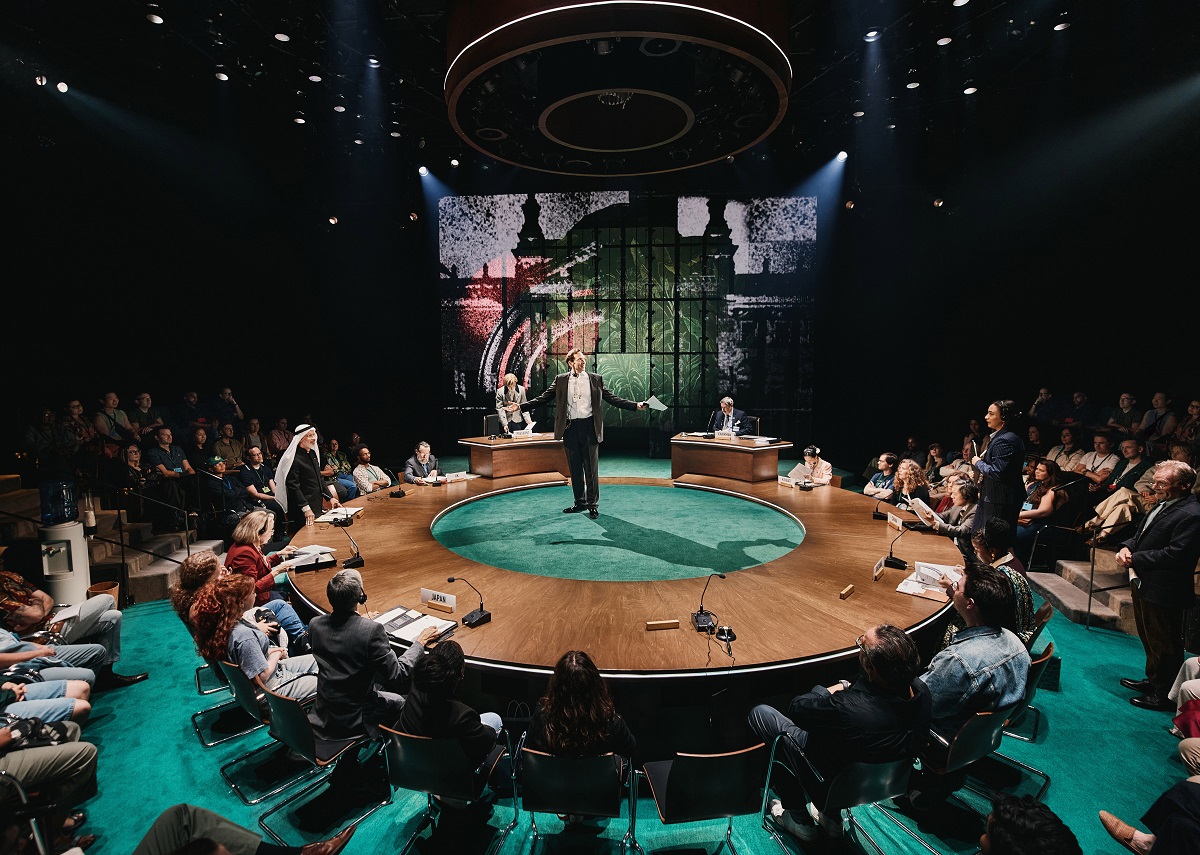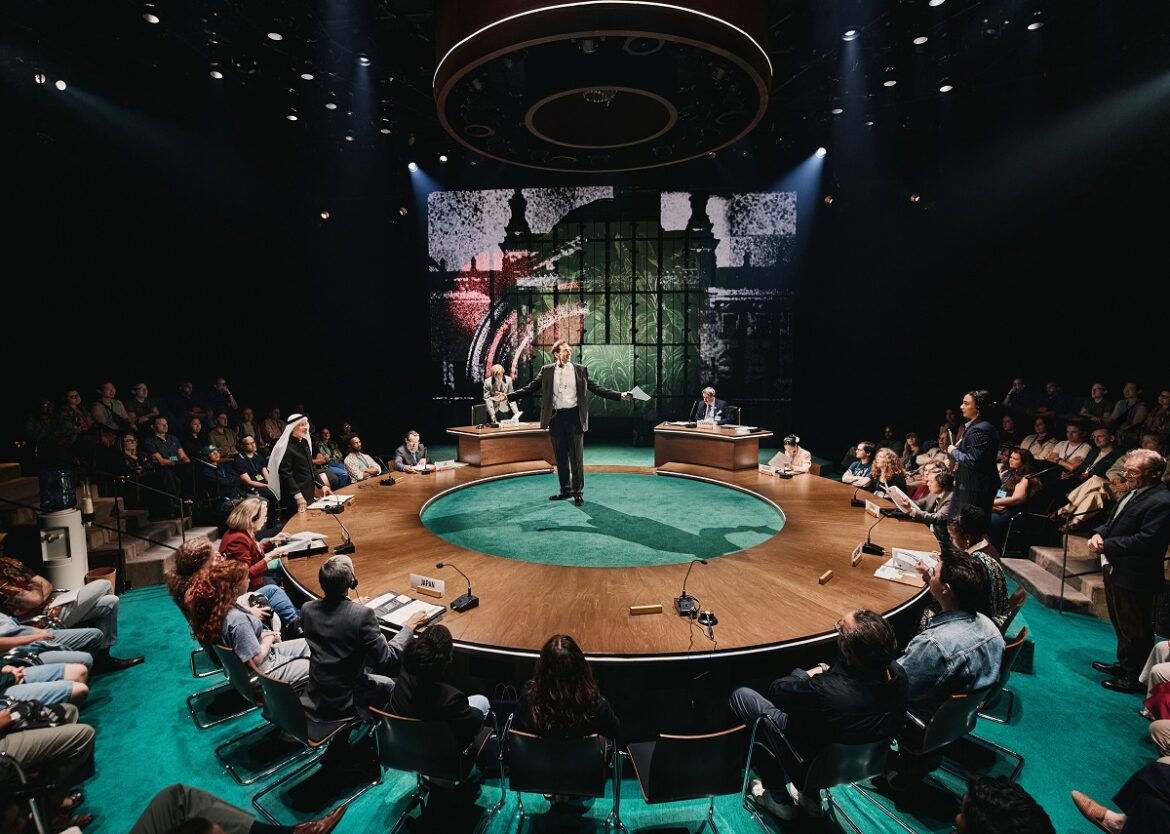November 3, 2025 10:30 pm
By Frank Scheck
★★★★★ Stephen Kunken superbly plays the lead role in this thrilling drama about the negotiations behind an historic climate accord
 Stephen Kunken and the cast of Kyoto. Photo: Emilio Madrid
Stephen Kunken and the cast of Kyoto. Photo: Emilio Madrid
If someone had told me that one of the most exciting plays in recent memory would revolve around such arguments as whether the word “would” or “could” was more appropriate and feature dialogue on the order of “We object to that missing preposition!” I’d have said they were daft. But that was before I saw Kyoto, now receiving its American premiere at Lincoln Center. Depicting the tense negotiations during a decade-long series of climate conferences culminating with the titular 1997 event that resulted in an historic international agreement to limit greenhouse gas emissions, the new drama by Joe Murphy and Joe Robertson (also responsible for the similarly gripping The Jungle), proves the most thrilling political thriller since Oslo.
Like that play about the Oslo Accords, this production threatens to overwhelm audience members with endless reams of technical exposition. And to some degree, it does. Running two hours and 45 minutes, the dense evening featuring loads of climate jargon and dozens of characters demands strict attention. But it amply rewards that attention, thanks to the witty writing and propulsive staging by Stephen Daldry and Justin Martin.
[Read Michael Sommers’ ★★★☆☆ review here.]
One of the play’s canniest elements is the use of the real-life lawyer/lobbyist Don Pearlman as narrator. Drawing us into the story with a lengthy monologue about how our world is coming apart due to angry divisions, he’s humorous and relatable, especially as superbly played by Stephen Kunken (one of a few actors repeating their roles from the British production). He’s also, as we eventually learn, the true villain of the piece, doing his best efforts on behalf of “The Seven Sisters,” the world’s leading oil companies, to scuttle any agreements that would constrain their relentless quest for profits. You find yourself rooting against him at every turn, but, like Richard III at his most devious, he’s a lot of fun to watch. And, it’s only fair to say, he makes some very good points. Even if he does taunt us at the end of Act I by announcing, “Intermission drinks will be provided by the Koch Brothers.”
The immersive staging helps to more fully draw you into the esoteric proceedings. You’re handed delegate badges to wear as you enter the theater, and several lucky audience members get to sit next to the actors at the large round conference table that forms the primary element of Miriam Beuther’s set design, along with the striking and informative visual projections by Akhila Krishnan.
As the delegates from such countries as the United States, China, Germany, Saudi Arabia, Japan, Tanzania, and the small island nation of Kiribati convene for a series of climate conferences, they vigorously debate the proposed verbiage for an agreement, demonstrating the power of language to both obfuscate and illuminate. We’re also introduced to a memorable series of characters, including the no-nonsense German, Angela Merkel (Erin Darke, nailing the officiousness); the blustery Brit, John Prescott (a very funny Ferdy Roberts); and the pragmatic American rep, a composite (Kate Burton). The most memorable, and eventually tragic, figure proves to be Raul Estrada-Oyuela, the jovial Argentine diplomat (Jorge Bosch, terrific) who chairs the Kyoto conference and uses all of his wiles to bully the delegates into submission.
There’s also Pearlman’s loving but beleaguered wife, Shirley (Natalie Gold), who watches helplessly as her husband does his best to scuttle the proceedings, frequently using the Saudi Arabian delegate (Dariush Kashani), with whom he’s in cahoots, to achieve his ends.
It all plays like a darkly comedic thriller, showing us how the diplomatic sausage is made that ultimately affects our very existence on the planet. Although there are occasional longueurs and scenes that feel more convoluted than necessary, the production proves so energetic and fast-paced that they don’t matter. This is the sort of evening in which one of the most exciting scenes features nothing more than two characters shouting adjectives at each other in a sort of linguistic duel to the death.
If all of that sounds too esoteric for you, did I mention that Kyoto also features a falling chandelier? Phantom of the Opera has nothing on this improbably thrilling play.
Kyoto opened November 3, 2025, at the Mitzi E. Newhouse Theater and runs through November 30. Tickets and information: lct.org


AloJapan.com